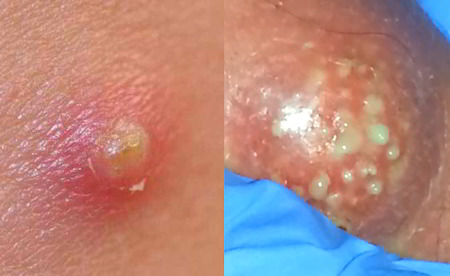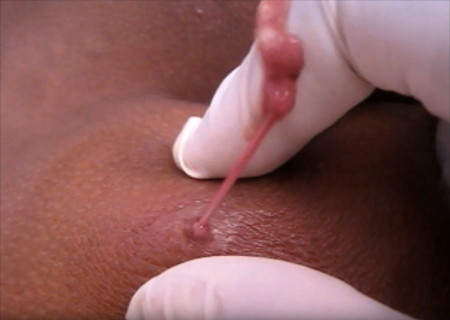Boils, Abscesses, Carbuncles: Overview
Boils are infected, pus-filled swellings in the skin that are often located in or near hair follicles. They are most often found on the back of the neck and in other moist areas of the body like the armpits and groin, but may be anywhere on the body. Sometimes several boils form close together in a cluster. A carbuncle is formed when several boils merge to form a single deep abscess with several heads or drainage points. An abscess can be so deep that it may not surface for a long time.
- understand what's happening to your body
- see your health summarized and in detail
- learn what you should be doing right now
Boils and carbuncles are firm reddish swellings about 5-10mm across that are slightly raised above the skin surface. They are sore to the touch. A boil usually has a visible central core of pus; a carbuncle is larger and has several visible heads. Boils occur most commonly on the face, back of the neck, buttocks, upper legs and groin area, armpits, and upper torso.
There are several different types of boils, including:

Furuncle or carbuncle: An abscess in the skin caused by the bacteria Staphylococcus aureus. It can have one or more openings onto the skin and may be associated with a fever or chills. They are less common than single boils; they are most likely to form at the back of the neck and in males. Carbuncles can form in the same areas as boils, and may also form on the scalp, face, and buttocks. Furunculosis is a word that is sometimes used to refer to recurrent boils. Many patients have repeated episodes of furunculosis that are difficult to treat because their nasal passages carry colonies of Staphylococcus aureus. These bacterial colonies make it easy for the patient's skin to be reinfected.
Folliculitis: A milder version of boils. This is an infection of hair follicles, usually with Staph bacteria. These often itch more than hurt. The appearance is similar to acne pustules.
Cystic acne: A type of abscess formed when oil ducts become clogged and infected. Cystic acne is most common in the teenage years.
Hidradenitis suppurativa: An uncommon illness of unknown cause in which there are multiple abscesses that form under the armpits, in the groin area, or under the breasts. These areas are a result of local inflammation of the sweat glands.
Pilonidal cyst: A type of abscess that occurs in the crease of the buttocks. These frequently form after long trips that involve sitting.
Causes and Development; Contributing Risk Factors
There are many causes of boils. Some boils can be caused by an ingrown hair. Others can form as the result of a splinter or other foreign material lodged in the skin. Others, such as those of acne, are caused by plugged sweat glands that become infected. Any break in the skin such as a cut or scrape can develop into an abscess if it becomes infected with bacteria.
Boils and carbuncles are more likely to develop in those with:
- Diabetes, especially when treated by injected insulin
- Alcoholism or drug abuse
- Poor personal hygiene
- Crowded living arrangements
- Jobs or hobbies that expose them to greasy or oily substances, especially petroleum products
- Allergies or immune system disorders, including HIV infection
- Family members with recurrent skin infections
Signs and Symptoms
A boil, or skin abscess, is a localized infection deep in the skin. A boil generally starts as an itchy, red, painful lump. Over time, the area becomes firm and hard. Usually within 24 hours, the lump fills with pus and takes on a round appearance with a yellow-white tip. Eventually, the center of the abscess softens; the pus forms a "head" and drains out through the skin.
There may be swelling around the boil as well as swelling of any lymph nodes near the boil.
Treatment and Prevention
Most simple boils can be treated at home. The treatment should start as soon as a boil is noticed since early treatment may prevent later problems.

Since releasing the pus in a boil can lead to more infection, puncturing it at home is not usually advised. If you do lance it, or if it bursts, make sure to sterilize the surrounding area carefully, washing hands after touching the area.
Medical treatment by a healthcare provider may include lancing or puncturing the boil to release the pressure and allow for drainage. Antibiotics may be prescribed to stop the infection.
Medications such as isotretinoin (Accutane) can be used for cystic acne; this has been helpful for some patients with hidradenitis suppurativa.
There are some measures that you can take to prevent abscesses from forming. Practicing good hygiene habits minimizes the frequency of recurring boils and prevents the spread of infection. This includes not picking at boils, using clean towels after each bath or shower, and cleaning the skin with an antiseptic / antibacterial soap such as Betadine. Antibacterial soaps may help prevent bacteria build up on the skin and therefore reduce the chance for an abscess to form.
Prognosis; Seek medical attention if...
Boils may take from 10 to 25 days to heal. In most cases, a boil will not heal until it bursts and drains. This can take as long as 5 to 7 days. A single boil can usually be cared for at home and does not require a trip to the doctor.
Recurrences are common in patients with hidradenitis suppurativa.
Any boil or abscess in a patient with diabetes or a patient with an underlying illness (such as cancer, rheumatoid arthritis, etc.) should be seen by a doctor. Additionally, many medicines, especially prednisone, that suppress the immune system (the natural infection-fighting system of the body) can complicate what would be an otherwise simple boil. Patients who are on such medications should consult their doctor if they develop boils.
Any boil that is associated with a fever should receive medical attention. A pilonidal cyst is a special case and almost always requires medical treatment including drainage and packing (putting gauze in the open abscess to assure it continues to drain). Finally, any painful boil that is not rapidly improving should be seen.
You should also see a doctor if:
- a boil develops in a child or a sick or elderly person
- a boil develops on the face near the eyes or nose
- a boil becomes extremely large or painful
- a cluster of boils form or you have an abscess
- boils become increasingly common
- red lines spread out from the center of the boil
- the boil is extremely tender
- fever and chills develop
- lymph nodes begin to swell that are located in other areas of the body from where the original lymph node swelling occurred.
On This Page
Boils/Abscesses:Conditions that suggest Boils, Abscesses, Carbuncles:
Symptoms - Immune System
Risk factors for Boils, Abscesses, Carbuncles:
Immunity
 Weakened Immune System
Weakened Immune System
Diseases that are associated with deficiencies in the normal immune system can increase the tendency to develop boils.
Organ Health
 Diabetes Type II
Diabetes Type II
People with certain illnesses, including diabetes, are more at risk of developing boils.
 Chronic Renal Insufficiency
Chronic Renal Insufficiency
People with certain illnesses, including kidney failure, are more at risk of developing boils.
Symptoms - Immune System
Recommendations for Boils, Abscesses, Carbuncles:
Botanical / Herbal
Drug
 Antibiotics
Antibiotics
Boils often resolve by themselves, but severe or recurring cases require medical treatment. Options include lancing and draining the boil, or antibiotics. If there is an infection of the surrounding skin, a doctor may decide to prescribe antibiotics. However, antibiotics are not needed in every case and, in fact, do not enter an abscess well and will not cure an abscess. For acne and hidradenitis suppurativa, antibiotics may be required on a long-term basis to prevent abscess formation. In cases of multiple or recurrent boils, antibiotics are taken by mouth for 10 or 14 days. Stubborn cases may require two oral antibiotics plus topical antibiotic ointments to eliminate the bacteria.
Homeopathy
 Homeopathic Remedies
Homeopathic Remedies
Boils, carbuncles and other septic conditions can be effectively treated through homoeopathy.
Suggested remedies include:
- Arsenicum album: Deeply infected boils with intensely burning pain and offensive discharge. Warmth and hot applications usually are soothing. The person may feel exhausted and ill, yet anxiety and discomfort also make them restless.
- Belladonna: Used in the early stages of inflammation, before much pus has formed. The area is red, hot, throbbing, and tender, often with intense or stabbing pains. Jarring or touch may increase discomfort. The person may also feel excitable or feverish.
- Calendula: Used as a topical application for boils and infected sores. It can be used in herbal form or in low dilution as a tincture, ointment, or compress. Taken internally, Calendula can help the body overcome infection.
- Echinacea angustifolia: People who need this remedy typically feel sickly, lethargic, achy, and chilly.
- Hepar sulphuris calcareum: When a boil is extremely tender and sensitive to touch, this remedy can be helpful. A splinter-like sticking pain is often felt. The boil may produce deep pockets of offensive pus or be slow to heal. This remedy is also indicated when boils seem to be spreading. A person who needs this remedy usually is vulnerable and touchy, with extreme sensitivity to cold.
- Mercurius solubilis: When boils are very sensitive with advanced development of pus. The person may have moist or greasy-looking skin, with swollen lymph nodes and offensive breath, and be very sensitive to changes in temperature. Warmth may aggravate the pain.
- Silica: Boils that form hard lumps and are slow to come to a head and slow to heal. If many boils form at once, or boils frequently recur, it is often very useful. People who need this remedy are sensitive and nervous, inclined toward colds and swollen glands, and easily fatigued.
- Tarentula cubensis: When a boil is sore and swollen with stinging, burning pain, and purplish or bluish discoloration of surrounding tissues. A person who needs this remedy may also have restless feet and difficulty sleeping.
Invasive / Surgery
 Surgery
Surgery
Surgery may occasionally be needed, especially in cases of pilonidal cysts that recur, but also for hidradenitis suppurativa. For pilonidal cysts, surgically removing the cyst lining is important. The procedure is typically performed in the operating room. For hidradenitis suppurativa, extensive involvement can require plastics surgical repair.
Mineral
Click to see sample report
Your body is a highly complex, interconnected system. Instead of guessing at what might be wrong, let us help you discover what is really going on inside your body based on the many clues it is giving.
Our multiple symptom checker provides in-depth health analysis by The Analyst™ with full explanations, recommendations and (optionally) doctors available for case review and answering your specific questions.
KEY









